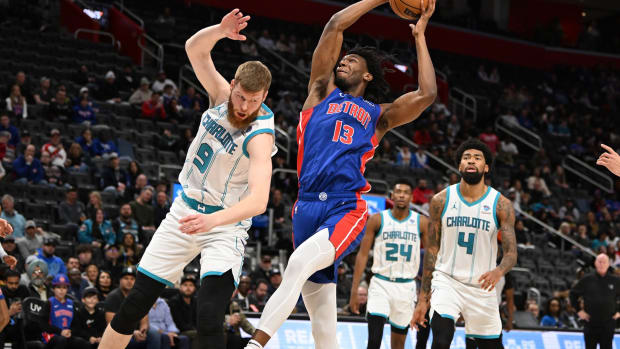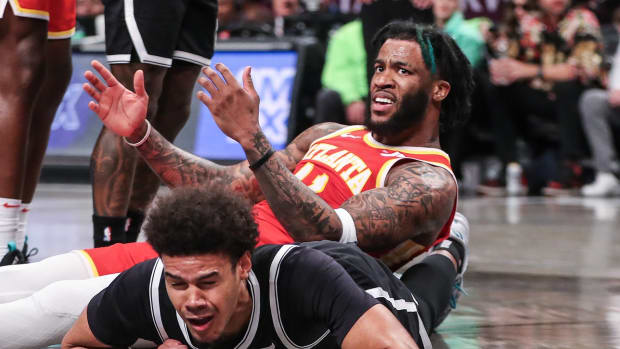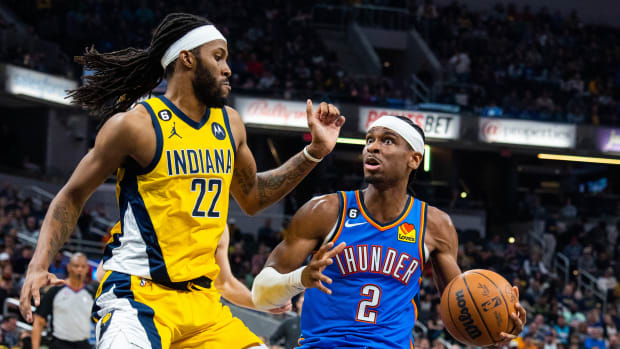Lusia Harris Is the Nearly-Forgotten ‘Queen of Basketball’ and Title IX Pioneer
Title IX radically altered the sports landscape, but not all at once and not without resistance. In the early years of the statute, the “forgotten heroes” challenged bias and championed equality—and the impact is still felt today. Read more about Title IX’s pioneers to remember here.
A lifelong gym rat who had parlayed her hoops passion into a career as a player and coach, Jenny Boucek was 33 before she discovered the pioneer who arguably made it all possible.
That would be Lusia Harris: the first woman to score a basket in the Olympics (1976), the only woman ever drafted by an NBA team (’77) and the first female college player inducted into the Basketball Hall of Fame (’92). Harris was, by many accounts, the first truly dominant player of the women’s game, a key trailblazer in the sport, though unknown to the generations who followed her.
Boucek, a college star at Virginia who played in the WNBA’s inaugural season, didn’t learn about Harris until 2007, after becoming coach of the league’s now defunct Sacramento Monarchs. After a lifetime of doing drills named for men, Boucek set out to recast her playbook by honoring legends of the women’s game. She promptly named a post drill after Harris, in hopes that her young players would gain a better appreciation for those who paved the way. “It’s something that we all have to be intentional about,” says Boucek, now an assistant coach with the NBA’s Pacers.
It wasn’t until this past year that Harris finally broke into mainstream consciousness, via the 22-minute documentary The Queen of Basketball, which debuted in 2021 and won an Oscar in March. The film was aided by the promotional muscle of its executive producers: Shaquille O’Neal and Stephen Curry.
In the documentary, Harris narrates her own story, as the daughter of Mississippi sharecroppers who stayed up late watching highlights of Bill Russell, Wilt Chamberlain and her idol, Oscar Robertson. She grew to be 6' 3", the tallest in her high school class, and later—in the wake of Title IX—starred at Delta State, leading her team to three straight national championships. After college, Harris says in the film, “I wanted to keep playing. But there was no place to go.”
Though New Orleans picked her in the seventh round of the 1977 NBA draft, Harris felt she wasn’t “good enough” and declined an invitation to training camp—a decision that surely contributed to her relative anonymity in the decades that followed.
“She was so good she got drafted by the Jazz. I was like, ‘Hold on, how come I never heard of this lady?’” says O’Neal, who showed the film to his basketball-playing daughter, Me’Arah, as a means for inspiring her to greater dominance. He calls Harris “unapologetically legendary.”
Harris died in January, at age 66. She lived long enough to see the women’s game grow and thrive, to witness the birth of the WNBA and to watch the stars of today enjoy the fame, commercial opportunities and career paths that were denied to her generation. That’s what struck former WNBA player and current Notre Dame coach Niele Ivey when she screened the film with her own players.
“It just shows how fortunate we are that we had a league to play in after college,” says Ivey. “Because so many women before us didn’t have the opportunity.”




































